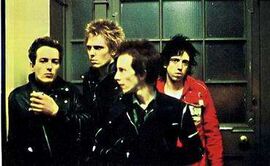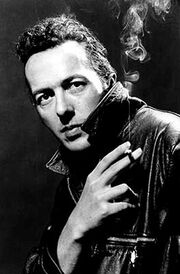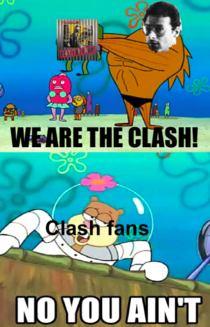The Clash
“Evrreethin's po'itical.”
“Whee! Bumper cars and shiny! Oh, politics? Yea, whatever Joe says.”
The Clash were an English punk rock band formed in the Garageland district of London in 1976. Ironically, no band member was a punk; rather, they were street fighters, led by vocalist/rhythm strummer Joe Strummer, lead guitarist/vocalist Mick Jones, basspicker Paul Simonon, and drummer Terry Chimes Topper Headon. They are best-known for their seminal albums Clash of The Clash, Give 'Em Enough Dope, London Gurning, Seadinista!, and Combative Rock. In 1983, Mick Jones was sacked and replaced by former Ramones member Markyramone Go. The new band then put out the travesty Cut the Smack and broke up in 1986.
The Clash were a musically diverse band, originating in the punk rock genre and progressing on to New Wave, post-punk, dub, reggae, cod reggae, ska, rocksteady, pop, funk, hip-hop, synth-pop, experimental rock, rockabilly, and Neue Deutsche Härte. They are regarded as having invented all these genres, as well as several others despite never playing them. They got their name because they used to run towards and clash into one another at their gigs.
Formation and The Clash[edit]
“I remember them when they were called The Splash. Or was that The Beach Boys?”
Originally named the Spec Spiff-els, The Clash were formed in London in 1976. They were fronted by "the only talented one" Mick "Stiv" Jones and backup dancer Paul "Shock the Monkey" Simonon, and managed by Bernard Rhodes, a sometimes-associate of Sex Pistols impresario Malcolm McLaren. But Mick and Paul smoked too many spliffs and soon forgot that they were in a band, so they went to the Casbah and rocked it like a boat. There they met a young Joe Strummer and an even younger Terry Chimes, and offered them positions in the band. Strummer had a questionable work ethic, but still believed in himself: "Oh yeah, I'm on the dole, but that doesn't mean I'm lazy. I'm gonna be a big rock star, then I'll tell everyone what to think!"
The Spiff-els then signed to CBS Records and changed their moniker to the cooler The Clash. Contrary to their official statement on South Park, they did not get this name because their clothes clashed; rather it is due to them banging bin lids over each other's heads until the lids clashed. This fact is referenced by the line "Smash your head, smash your head" on the first song of the debut album by the self-titled Bin Lids in 1987.
“CBS promote the Clash.
But it ain't for revolution, it's just for cash.
Punk became a fashion just like hippie used to be.
And it ain't got a thing to do with you or me.”
The Clash's first album, innovatively titled The Clash, was recorded and mixed in a mere three weeks in 1977 for £4,000. It contained politically-charged, controversial songs such as "White Riot" (about riots that are apparently filled with white noise), "Police and Thieves" (about cops and robbers shooting the nation with their guns and ammunition in the street), "War & Hate" (about war and hate), "I'm So Bored with the U.S.A." (about being bored with boring countries), "Clash City Rockers" (about rockers hailing from the city of Clash, such as a Move, the bells of St. Groove, Gary Glitter, Ol' Bowie, Prince, and Prince Fari), "(White Man) in Hammersmith Palais" (about being the only white person at a reggae concert. He's the all-night drug-prowlin' wolf who looks so sick in the Sun, he's the white man in the Palais, just-a lookin' for fun), "Jail Guitar Doors" (about the imprisonment of fellow musician Wayne Kramer in doors of a jail in the shape of a guitar that go 'clang clang', boots that go 'bang bang' on the floor, and lonely mothers' sons that 'cry cry'), "City of the Dead" (about London being Zombieland), and "They Said Release Remote Control, But We Didn't Want It On the Label" (about civic hall bureaucrats who cancel concerts, the police, big business, and especially record companies).
The album created a decent splash on the music charts, peaking at no. 12 in the UK, and attracted positive attention from the music press as part of that year's Summer of Punk. However, many underground punks weren't happy at how groups like The Clash, the Sex Pistols, and The Ramones were popifying their scene. The band Crass in particular dissed The Clash with the songs "Punk Is Dead" and "White Punks on Hope" (though singer Steve Ignorant later admitted he secretly kept buying their records after this). Of note, on the album sleeve for The Clash '77, the drummer was listed as Tory Crimes rather than Terry Chimes. Was it a typo or...?
Give 'Em Enough Swiss Army Rope[edit]
“You can try to crush us, you can try to bruise us, but you'll probably get beaten up by us if you do...”
...no. This is where Terry/Tory Chimes/Crimes left because he was too Catholic to be in the band, and Gorillaz-inspired, cartoon monkey Topper Headon comes in. In 1978 The Clash, inspired by their success in the First Punk War, founded their own nation, now known as Switzerland. At the time of founding it was known as the "Safe European Home", seemingly the inspiration for their hit, "Julie's Been Working for the Drug Squad". The album also contained more political singles like "Tommy Gun", "Guns on the Roof" (two songs about guns on the same album?), "English Civil War" (Who hid a radio under the stairs?), "Drug Stabbing Time" (a non-sequitor), and "I Fought the Law" (a cover of the Bobby Fuller Four standard, about losing in actual fistfights with the law).
Topper, along with Strummer, Jones, and Simonon, decided that the production on the band's first album had been too low-quality, banal, trite, redundant, etc. So they hired Sandy Pearlman of the Blue Oyster Cult to produce their second album Give 'Em Enough Rope, which greatly increased the volume of the guitars but had the unintended side-effect of slightly draining out the vocals. The result was an album that was commercially successful, but somewhat lacked the punch of their debut. Also by this point, Bernie Rhodes decided to part ways with the group, feeling they had lost their fingerpoppin' street cred. He went on to manage other quirky bands like The Specials and Dexys Midnight Runners. It was time for The Clash to re-hone their skills.
London Calling[edit]
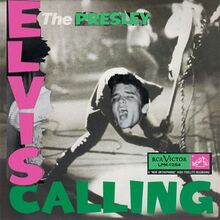
“I'm lost...in a supermarket...”
“London calling, now don't look to us,
Phoney Beatlemania has bitten the dust.
London calling, see we ain't got no swing,
Except for the ring of the truncheon thing.”
In 1979 the band released their seminal, greatest album, the double-disc London Calling. The Clash were previously infamous for their political messages in songs. When not talking about politics, their music often talked about absurd shit taking place in London society. Hit singles and songs from the album included "Jimmy Jazz" (about some underworld criminal bloke named Jimmy that likes jazz), "Lovers Rock" (about lovemaking), "Train in Vain" (a "Stand by Me" cover about trains being self-important and/or flamboyant), "Lost in the Supermarket" (going to and getting lost in markets in the need to realise one's soul), "Rudie Can't Fail" (about some guy named Rudie who apparently, truly cannot fail), "Spanish Bombs" (bombs of Spanish descent), "London Calling/London Burning" (capital cities making phones calls and then dialling the number "9-9-9" due to them burning with boredom), "Death or Glory" (dying, or being victorious thus achieving glory), "Guns of Brixton" (about a Jimmy Cliff fan who lives in a London borough and is in the possession of guns), "The Right Profile" (about correctly identifying Montgomery Clift, no relation to Jimmy Cliff), "Clampdown" (about government brainwashing), "Four Horsemen" (about how Johnny Rotten and the other Sex Pistols imploded upon themselves), and "I'm Not Down" (a repudiation of the phoney Beatles song "I'm Down").
It was on this record that The Clash's reggae influences became more prominent and the punk influences toned-down, an interesting anomaly since these whiteboys lacked any soul required to be real reggae. According to Paul Simonon, "I played reggae 'cos with reggae rekkids, you can actually hear what the bassist was doing."
Sandinista![edit]
“The Clash destroyed my home, my car, my garden, and my relationship with my husband, all in one evening. All in all it was a rip-roaring good time.”
In 1980 The Clash released Sandinista!, a sprawling sextuple album featuring more dubbed-out reggae than you could handle, plus other weird experiments. The album followed the concept of The Clash (codenamed "The Magnificent Seven", a tribute to the Western film of the same name) joining the Sandinista National Liberation Front during the Nicaraguan Revolution, and being among the first socialist forces to storm the Casa Presidencial and attempt to overthrow the Somoza dictatorship. The MagSe7en were led by Comrade Joe Strummer, who unfortunately died four days after the invasion (only in the album's story, that is) when he had police on his back. He was replaced by Comrade Mick Jones, who also died (again, not really). After this nobody wanted to be leader of The Clash, and a great fight broke out among the remaining rebels, who killed each other during the conflict. Only one remained: young Topper Headon. He became so upset over being the last remaining member of his squadron (thus making him Comrade Headon), that he applied bullets directly to the forehead (again again, only in these fascist record groove thangs).
Nuggets of insanity contained on the record include "Rebel Waltz" (about a rogue three-step dance), "If Music Could Talk" (about pondering the communication skills of music), "Charlie Don't Surf" (about some guy who apparently takes the Boston subway a lot, not being able to board across water. He choses to be a "napalm star" rather than surf for his hamburger mum or because people think he should. Also, he's the guy who the Boston "CharlieCard" (like the London "oyster card") is named after), "Junco Partner" (about a partner who is addicted to heroin and wobbling all over the street appearing 'knocked-out' and 'loaded'), "Armagideon Time" (about time(s) being both 'groovy', 'tight', and 'armagideon'), "Junkie Slip" (about the time of day at which it is appropriate to stab a junkie), "Hitsville UK" (about boys and girls suddenly becoming not alone now that the 'ville' of 'hits', in fact, hit the UK; Shareef's not liking it and 'cruising down the ville'), and "Thi$ I$ Radio Cla$h" (on pirate satellite).
Over the years, The Clash were rumoured to have destroyed no fewer than 70% of all sports centres in England, and to have made a considerable start on Canada. During their 1980 tour the group attended a rowdy party in Edmonton, Canada's famous Kinsmen Fieldhouse, which was toppled when bassist Paul Simon Simonon smashed his guitar over the head of three fans of the band, now former fans of the band, while stating that "You can call me Al." Nobody has any idea why he said this. Also, Headon jumped out windows of the 51st floor rooms whilst drinking Kola-Kola. As a result of all this chaos, the band were not invited back.
1980 saw the release of The Black Market Clash on Broadway: The Clash's Greatest Non-Hits Volume 1 (This Is Our Bootleg Vinyl Picture Disc Pressed with the Painting Paul Did of Joe Naked Displayed as the Pic On the Disc). Chopper Headoff was briefly out of the nick due to his drug problem, so the band resolved they better release this Greatest (Non-)Hits album to get him some cash.
The album received mixed reviews due to its overambition, with critics describing it as "The White Album with socialism. Also, there's a YMCA cover." By this point the band were deep into debt, skint, and had lost much of their popularity, mainly due to them straying from their already-thin punk roots and putting too damn many songs on their last two albums. The other band members still hated Bernie Rhodes, but Joe still liked Bernie and was a real "Bernie Bro". Begrudgingly they re-hired Rhodes to bail them out, and they were back on track...for the time being.
Combat Rocktroversy[edit]
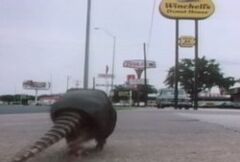
“Lock the cashbox, lock the cashbox.”
In 1982 the band put out Combat Rock, a return to the stripped-down structure of their first two albums. It contained the radio hits "Rock the Casbah" (an attempt at bringing peace between Jews and Muslims in the oil fields of the Middle East Austin, Texas) and "Should I Stay Or Should I Go" (later featured in a million romantic comedy trailers), as well as more politically-oriented songs such as "Know Your Rights" (to inform listeners of all three of their (given) rights), "Straight to Hell" (about the discrimination against steel workers in Northern England, half-Vietnamese love children in Vietnam, and "immigrants" in Puerto Rico), "Ghetto Defendant" (featuring a spoken word monologue from Allen Ginsberg), "Sean Flynn" (about Flynn being a POW in Vietnam, wondering if it's really his son Errol's birthday today), "Overpowered by Funk" (Joe's bad-smelling attempt at hip-hop), "Red Angel Dragnet" (angels that are dragnets(?) coloured in red(?)), and "Car Jamming" (spreading jam over cars).
Due to the profane-sounding name of the band's black metal single "Rock the Casbah" and the 6-minute sample of said act used in the outro to the song, several radio stations started banning the song. A watershed edited remix was aptly made and released instead in light of this. The remix did not chart. An extended, unedited version of the track was also included on the Clash rarities album When the Two Sevens Mix, released on the Reha$hes Reha$hes label. Though popular among certain buyers, this version also did not chart. Also that year the band put out the live album Live at Shea Stadium, which was, in fact, not a live album. For a larger effect, audience samples from a Simon & Garfunkel reunion tour album were used as crowd cheering overdubbed over a studio recording. This caused both Simon & Garfunkel to file a sue, costing ¥600,000.
Over the decade the band had been together it underwent relatively few changes in members. This all changed in 1982, when Chopper Headoff began stealing all their income in order to fund his addiction to Kendal Mint Cake. To combat his stress and guilt Topper began doing smack, and could no longer smack the drums properly. He was was fired after they uncovered his fridge-raiding. Bernie Rhodes also convinced Joe Strummer to fire Mick Jones because he was being a knob. Mick would form his own group called Big Audio Dynamite, who mixed the usual New Wave and post-punk sounds with large doses of hip-hop and electronic music, replete with various movie and song samples in a cut-up form.
Joe and Mick were one of the best songwriting partnerships since Lennon/McCartney, and had promised to stand by each other, but when one was without the other the band faltered. Topper Headon had also held The Clash together; though he was their drummer, he also wrote a lot of their music (see "Rock the Casbah" and "Ivan Meets G.I. Joe"). Had he stayed off the smack then The Clash could've continued as The Only Band That Mattered, but when him and Mick left, Joe Strummer and Paul Simonon were incapable of doing anything significant. This is why somebody should've made Hubert Selby's book Requiem for a Dream into a movie earlier. Now we all know heroin is bad. And sadly, this isn't where our story ends...
Cut the Crap and breakup[edit]
“Drugs are over from this minute now. Anybody who takes a drug is a hippie, and hippies can shove off.”
“Looks like they forgot to cut it.”
Terry Chimes temporarily chimed in to replace Topper, but left again in February 1983, later going on to join Black Sabbath. New band members were thus recruited to round out The Clash Mk II; famously, Nick Sheppard of The Cortinas strummed lead guitar for Strummer, while superfans Pete Howard and Vince White played drums and rhythm guitar respectively. This was however regarded as a downpoint for the band, as the new members didn't even get to appear on-record. Strummer had intended for their new album Out of Control to be a "back to basics" punk album, but Bernie Rhodes had other plans. When Strummer's parents died, Joe mentally checked out of the recording sessions and let Bernie take over. In an attempt to compete with Mick's innovation Rhodes remixed the album, stripping out Pete and Paul's live instrumentation and adding cheap '80s production and samples from Spanish radio programs, and changed its title to the rather fitting Cut the Crap.
In May 1985, signs of trouble came when Clash were defeated by Big Audio Dynamite in a busking rock-off; the whole story can be found on the Torah of Rock. The new Clash tried to reassure fans that "We Are The Clash", but the fans weren't buying it. When the finished album hit the shelves in November, Strummer realised what a terrible mistake he made allowing Bernie to fire Mick then slave drive him around like a puppet. Rhodes had also used the pseudonym "Jose Unidos" on the album sleeve, fooling listeners into thinking Joe was the producer and not him. Strummer retreated to Spain to escape the inevitable bad press, and went on a mini-quest to unearth the corpse of Spanish poet Federico García. When that failed, Joe returned to Britain in 1986 and officially disbanded The Clash, compensating the remaining members £1,000 each. Bitterly, Pete Howard told him "This is what you get for following Bernie's lead," to which Joe nodded his head sadly.
Years later, a survey in the UK conducted by MI6 found that approximately 98% of the population believed there never was, never had been, and never would be a band called The Clash Mk II, or an album called Cut the Crap. Interestingly, in another survey of the UK by Rolling Stone magazine, it was found that around 99% of Englishmen claimed to have played and/or sung for this incarnation of The Clash around that time.
Aftermath[edit]
The animosity between Jones and Strummer ended swiftly, as in 1986 they reconciled and played together on the second BAD album. Also that year, Joe Strummer shamefully (or not) wrote the music for Sid and Nancy, about the titular Sid Vicious and his tortured relationship with his titular gal pal Nancy.
In 1988, the double-disc Story of The Clash was released, a compilation centred around Bernie Rhodes's favourite tunes from his their career. It featured an alternative edit of "Dictator" with an extended 'synth-horn cacophony' intro, the rest of Cut the Crap in its entirety, and all the hip-hop/dub tracks The Clash did but with Bernie's own rap verses dubbed over the original ones.
In 1999 From Here to Eternity: Live was released, a live compilation with instrumental studio overdubs to supposedly "repair" the original recording.
Decades after The Clash disbanded, Jones and the late great Strummer reunited in 2002 to play a few shows, and also supported Busted on their world tour. This unplugged album would later be released as Joe Strummer Sings the Blues (Doesn't He Always?); tracks of The Clash featured are "Teenage Kicks", "Top of the Tops", "Schmildren of the Schmevolution", and "I'm So Bored With the U.S.A.".
This reunion was short-lived, however, because Strummer died weeks later, much to the lament of his fans. Of extra note, Strummer's stepdaughter Lyza Jane is a model and trip hop musician, because punk just isn't her vibe.
Where Are They Now?...[edit]
It is rumoured that Joe Strummer died for legal reasons (basically an attempt to get out of a clause in his contract that said from 2002 onwards, all of his royalties from The Clash would go towards his pet dog in milk bones). Although believed by all of The Clash's 27 fans, this is in fact untrue; Joe can be found hanging around the back of the Pedigree factory in Sharston after the workers knock off, filling his pockets with waste treats from the bins in an attempt to appease the very angry doggie who hounds him daily.
Chopper Headoff works at the Nottingham branch of Manganese Bronze Holdings, driving mini-cabs from 5PM till 10PM to finance his heroin addiction. He also briefly busked on the London Underground with bongo drums.
Paul Simonon and Mick Jones can still be seen around the streets of Biggleswade. Paul tugs on Mick's leash while maniacally shouting "Dance monkey boy, dance!!!" Shows start at 2PM daily on Church Street.
99% of Englishmen are currently working in shitty jobs up and down the UK.
See also[edit]
| Featured version: 18 December 2022 | |
| This article has been featured on the main page. — You can vote for or nominate your favourite articles at Uncyclopedia:VFH. | |
